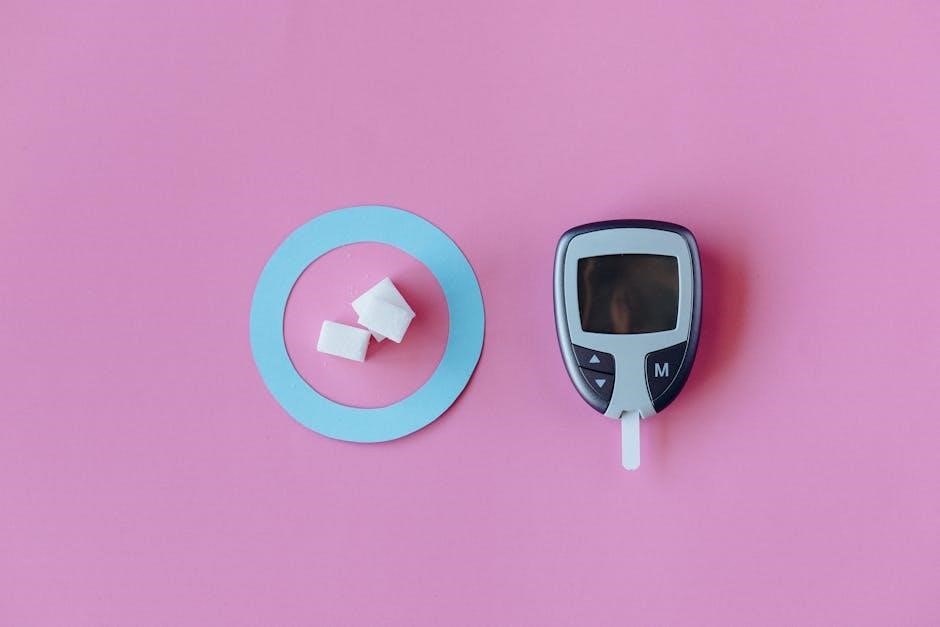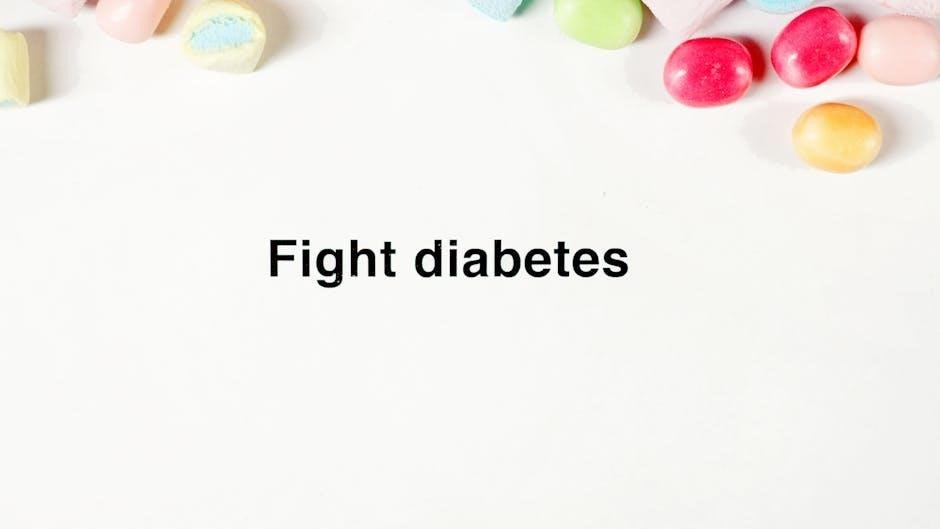
14 day no sugar diet pdf
Embark on a transformative 14-day journey to reset your health by eliminating added sugars. This structured plan helps kickstart weight loss and improve overall wellbeing.
1.1. What is a No-Sugar Diet?
A no-sugar diet focuses on eliminating added sugars from your diet while allowing natural sugars found in whole foods like fruits, vegetables, and dairy. It aims to improve health by reducing sugar intake, promoting weight loss, and curbing cravings. This approach encourages whole, nutrient-rich foods over processed and sugary items, fostering better eating habits and overall well-being.
1.2. Why Choose a 14-Day Plan?
A 14-day no-sugar plan is an ideal duration to reset habits, kickstart metabolism, and reduce sugar cravings. It’s short enough to stay committed yet long enough to see results. This timeframe allows your body to adapt, making it easier to transition to a healthier lifestyle. A structured two-week plan helps build discipline and motivation for long-term success.

Understanding Sugar and Its Impact on Health
Sugar is a prevalent ingredient in modern diets, often linked to energy fluctuations, inflammation, and increased risk of chronic diseases like diabetes and heart disease.
2.1. Types of Sugar: Natural vs. Added
Natural sugars, like those in fruits and dairy, occur naturally with fiber and nutrients. Added sugars, found in processed foods and drinks, lack nutritional value and are often overconsumed.
2.2. How Sugar Affects the Body
Sugar spikes blood sugar levels, triggering insulin release. Over time, excessive sugar consumption can lead to insulin resistance, weight gain, and increased risk of type 2 diabetes and heart disease.
2.3. Health Benefits of Reducing Sugar Intake
Reducing sugar intake promotes weight loss, stabilizes blood sugar levels, and improves heart health. It also enhances energy levels, supports liver function, and lowers the risk of chronic diseases like diabetes and certain cancers.
Benefits of a No-Sugar Diet
Discover how a no-sugar diet transforms your health, offering weight loss, improved metabolism, boosted energy, and reduced chronic disease risks for a healthier lifestyle.
3.1. Weight Loss and Improved Metabolism
Eliminating added sugars helps your body shed excess weight by reducing calorie intake and preventing fat storage. Without the sugar spikes, your metabolism stabilizes, burning fat more efficiently. By avoiding insulin surges, your body transitions to a fat-burning state, enhancing weight loss. Stable blood sugar levels also suppress hunger, making it easier to stick to your diet and notice improved metabolic function within two weeks.
3.2. Enhanced Energy Levels and Mental Clarity
By eliminating sugar, you avoid energy fluctuations caused by spikes and crashes. Your body begins to rely on steady sources like fats and proteins, providing consistent energy. Mental clarity improves as inflammation decreases, and blood flow to the brain enhances. Stable blood sugar levels also reduce brain fog, allowing for sharper focus and increased productivity throughout the day.
3.3. Reduced Risk of Chronic Diseases
Lowering sugar intake significantly reduces the risk of chronic diseases like diabetes, heart disease, and fatty liver. Excess sugar can lead to insulin resistance and inflammation, key contributors to these conditions. By cutting added sugars, you help regulate blood pressure, cholesterol, and blood sugar levels, fostering a healthier cardiovascular system and overall well-being.

The 14-Day No-Sugar Diet Plan
Discover a structured 14-day no-sugar diet plan designed to help you break sugar dependency and improve overall health through sustainable nutrition and lifestyle changes.
Begin with a gentle transition, focusing on hydration, whole foods, and protein-rich meals. Eliminate added sugars gradually, incorporating healthy swaps and meal prepping to set a strong foundation for success.
4.2. Days 8-14: Increasing Intensity and Focus
Build on the momentum from Days 1-7 by intensifying your commitment. Focus on stricter adherence to no added sugars, exploring new recipes, and balancing macronutrients. Incorporate physical activity to enhance fat burning and energy levels. Stay vigilant about hidden sugars and prioritize whole, nutrient-dense foods to maintain progress and motivation through the final week.
4.3. Meal Prep Tips for Success
Plan your meals weekly, focusing on whole foods like proteins, vegetables, and healthy fats. Shop for ingredients in advance and prep meals in batches to save time. Use containers to store pre-portioned meals, ensuring convenience and adherence. Avoid last-minute decisions by having healthy snacks ready. Consistency and organization are key to staying on track and achieving your goals.

Foods to Eat and Avoid
Focus on whole, nutrient-dense foods like lean meats, fish, eggs, vegetables, and healthy fats. Avoid sugary drinks, processed foods, and hidden sugars to support your diet goals.
5.1. Allowed Foods: Proteins, Vegetables, and Healthy Fats
Focus on lean proteins like chicken, turkey, fish, and eggs. Include a variety of colorful vegetables such as broccoli, spinach, and bell peppers. Incorporate healthy fats like avocados, nuts, and olive oil. Opt for whole, unprocessed foods and always check labels to avoid hidden sugars, ensuring a balanced and nutritious diet.
5.2. Foods to Avoid: Sugary Drinks, Processed Foods, and Hidden Sugars
Eliminate sugary drinks like soda, juice, and sweetened beverages. Avoid processed foods, including snacks, baked goods, and ready-to-eat meals, which often contain added sugars. Be cautious of hidden sugars in condiments, sauces, and dressings. Always read labels to identify and avoid ingredients like high-fructose corn syrup, honey, and maple syrup, ensuring a sugar-free diet.
Managing Sugar Cravings
Identify triggers, stay hydrated, and opt for healthy snacks. Mindful eating and gradual sugar reduction can help curb cravings effectively. Stay committed to your goals.
6.1. Understanding Sugar Cravings
Sugar cravings are intense desires for sweet foods, often triggered by emotional states or physiological responses. They can stem from insulin spikes, dopamine release, or habits. Emotional triggers like stress or boredom also play a role. Recognizing these patterns is key to managing cravings effectively and staying committed to your diet goals.
6.2. Healthy Alternatives to Satisfy Cravings
Combat sugar cravings with nutrient-rich options like fresh fruits, nuts, or dark chocolate (at least 85% cocoa). Herbal teas, veggie sticks with hummus, or a handful of seeds also curb sweet desires. These alternatives provide natural sweetness or satisfying textures, helping you stay on track without compromising your diet goals.
Maintaining a Low-Sugar Lifestyle Beyond 14 Days
Transitioning to a low-sugar lifestyle beyond 14 days requires building sustainable habits and making mindful choices. It supports long-term health and consistent energy levels.
7.1. Long-Term Benefits of a Low-Sugar Diet
Adopting a low-sugar lifestyle offers lasting advantages, including improved blood sugar regulation, enhanced weight management, and reduced risk of chronic diseases like diabetes and heart conditions. Additionally, it promotes better digestion, clearer skin, and increased energy levels, fostering overall wellness and longevity.
- Supports long-term weight management
- Improves blood sugar control
- Reduces risk of chronic diseases
- Enhances digestive health
- Boosts mental clarity and focus
7.2. Tips for Sustaining a Healthy Diet
Establishing a sustainable routine is key to long-term success. Meal prep, planning balanced meals, and incorporating variety ensure consistency. Stay hydrated, opt for healthy alternatives, and practice mindful eating. Set realistic goals, celebrate small victories, and seek support from like-minded individuals to maintain motivation and adapt to a healthier lifestyle.
- Plan and prep meals in advance
- Incorporate a variety of whole foods
- Stay hydrated to reduce cravings
- Find healthy alternatives to sugary treats
- Practice mindful eating habits

Recipes and Snacks for a No-Sugar Diet
Discover delicious, sugar-free recipes and snacks to keep you satisfied throughout the day. Focus on fresh ingredients like lean proteins, vegetables, and healthy fats for lasting energy.
- Scrambled eggs with spinach and avocado
- Grilled chicken or fish with roasted vegetables
- Salads with olive oil and vinegar dressings
- Nuts, seeds, and berries for quick snacks
8.1. Breakfast Ideas
Start your day with nutrient-rich, sugar-free breakfasts. Try scrambled eggs with spinach, avocado toast on whole-grain bread, or Greek yogurt with chia seeds and fresh berries. For a quick option, blend a protein smoothie with unsweetened almond milk, spinach, and almond butter. Avoid sugary cereals and opt for whole foods to maintain energy and focus throughout the morning.
- Eggs with sautéed vegetables
- Chia pudding with coconut milk
- Smoked salmon on whole-grain toast
8.2. Lunch and Dinner Options
Focus on balanced, sugar-free meals featuring lean proteins, vibrant vegetables, and healthy fats. Grilled chicken or fish with roasted vegetables, hearty salads with olive oil dressing, and stir-fries with cauliflower rice are excellent choices. Avoid sauces with added sugars and opt for herbs and spices for flavor. Pair meals with a side of avocado or nuts for sustained energy.
- Grilled chicken or salmon with steamed greens
- Vegetable stir-fry with coconut aminos
- Cauliflower pizza with fresh toppings
8.3. Healthy Snack Choices
Keep your energy levels steady with nutrient-dense, low-carb snacks. Nuts, seeds, veggie sticks with guacamole or hummus, and protein-rich options like hard-boiled eggs or Greek yogurt are ideal. Avoid sugary dips and opt for unsweetened varieties. Portion control is key to maintaining balance while satisfying cravings between meals.
- Raw almonds, walnuts, or pumpkin seeds
- Carrot, cucumber, or celery sticks with dips
- Handful of berries or a small apple
- Boiled eggs or unsweetened Greek yogurt

Addressing Challenges and Setbacks
Everyone faces challenges, but staying committed is key. Identify triggers, stay hydrated, and plan meals to avoid setbacks. Remember, small slip-ups don’t define your journey—keep moving forward.
9.1. Common Challenges on a No-Sugar Diet
Common challenges include intense sugar cravings, irritability, and fatigue, especially in the first week. Social pressures, meal planning difficulties, and hidden sugars in foods can also pose obstacles; Emotional eating and temptation during celebrations may arise, requiring strong willpower and strategic planning to stay on track.
9.2. Strategies to Overcome Setbacks
Plan meals in advance to avoid impulsive choices. Stay hydrated to curb false hunger. Keep healthy alternatives handy to satisfy cravings. Practice mindful eating and identify emotional triggers. Build a support system for motivation. Celebrate small victories to stay encouraged. Be kind to yourself during slips and refocus quickly to maintain progress.
Celebrate your success and embrace the positive changes. Be proud of the progress made and the healthier habits adopted. Continue your journey toward a sugar-free lifestyle.
10.1. Recap of the 14-Day No-Sugar Diet
This 14-day plan helps reset your palate, reduce sugar dependence, and improve overall well-being. By eliminating added sugars and focusing on whole, nutrient-rich foods, you’ve taken a significant step toward a healthier lifestyle. Celebrate your progress, and use the knowledge gained to continue making informed, sugar-aware choices moving forward.
10.2. Encouragement for Continuing the Journey
Congratulations on completing the 14-day no-sugar diet! You’ve made significant strides toward a healthier lifestyle. Remember, this is just the beginning. The energy, clarity, and confidence you’ve gained are powerful motivators. Keep nurturing your body with whole foods and celebrate small victories along the way. Share your success and inspire others to join you on this life-changing journey.

Call to Action
Start your 14-day no-sugar diet today and transform your health. Join others, share your journey, and celebrate the incredible benefits of a low-sugar lifestyle!
11.1. Start Your 14-Day No-Sugar Diet Today
Ready to transform your health? Begin your 14-day no-sugar journey now! Download the guide, commit to the plan, and experience the energy and clarity you deserve. Take the first step toward a healthier, sugar-free lifestyle with confidence and determination. Your body—and mind—will thank you!
11.2. Share Your Experience and Results
After completing the 14-day no-sugar diet, share your journey! Post your progress on social media, join support groups, or blog about your success. Your story can inspire others and keep you accountable. Celebrate your achievements, whether it’s weight loss, improved energy, or clearer thinking. Use hashtags like #NoSugarChallenge to connect with a community and stay motivated!
Additional Resources
Enhance your journey with recommended books and online communities. Check out The No-Sugar Cookbook and Sugar-Free Living Guide. Join forums like Sugar-Free Forum and Low-Carb Living for support and tips.
12.1. Recommended Reading and Guides
Discover essential resources like The No-Sugar Cookbook and Sugar-Free Living Guide. These books offer meal ideas, recipes, and insights into sugar’s impact. Low-Carb Living Blog also provides valuable tips and success stories to keep you motivated and informed throughout your journey.
12.2. Online Communities and Support Groups
Join online forums like Facebook Groups or Reddit’s r/LowCarb to connect with others on a no-sugar journey. Platforms like MyFitnessPal offer community support and tracking tools. Engage in Instagram challenges or follow Pinterest boards for inspiration. These communities provide motivation, tips, and accountability to help you stay on track and celebrate milestones.
Final Words of Motivation
Congratulations on completing your 14-day no-sugar journey! You’ve taken significant steps toward improving your health. Celebrate your success and remember the benefits—more energy, clearer mind, and better overall wellbeing. Keep pushing forward and maintain your healthy habits. You’ve got this! Embrace the positive changes and continue thriving. Your journey to a healthier lifestyle is just beginning!
